Working with T-FLEX DOCs Files |
  
|
When working in the integration mode, you can use T‑FLEX DOCs unified file storage to store files of drawings and 3D models and attach files to objects of the ![]() Product Structure dataset. This provides unity and validity of design documentation data.
Product Structure dataset. This provides unity and validity of design documentation data.
You can open a file from DOCs, save file to DOCs and view DOCs properties of a file.
A T-FLEX CAD file stored in T‑FLEX DOCs ![]() Files dataset can be opened in one of the following ways:
Files dataset can be opened in one of the following ways:
Press and hold ![]() at an object linked to a T-FLEX CAD file in a window of any T-FLEX DOCs dataset. Keep holding
at an object linked to a T-FLEX CAD file in a window of any T-FLEX DOCs dataset. Keep holding ![]() and move the cursor over any area of the T-FLEX CAD main window, except drawing window, 3D scene and the window of the current dataset. Then release
and move the cursor over any area of the T-FLEX CAD main window, except drawing window, 3D scene and the window of the current dataset. Then release ![]() . A window will appear, where you can set following parameters of document's opening:
. A window will appear, where you can set following parameters of document's opening:
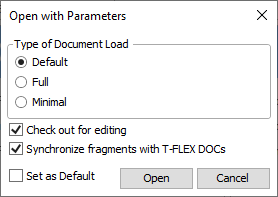
•Type of Document Load:
oDefault
The model tree, support geometry and meshed representation of bodies are loaded. Meshes require less system resources than solids but can only be used for visualization. Full solid representations of bodies will be loaded automatically when necessary upon editing the model.
oFull
The model tree, support geometry, meshes and solids are loaded.
oMinimal
The model tree, support geometry are loaded along with meshes only for bodies of the current document. Bodies of fragments are not loaded and not visible in the 3D scene.
•Check out for editing
If the checkbox is enabled, then the file will be checked out for editing upon opening, otherwise the file will be opened read-only.
•Synchronize fragments with T-FLEX DOCs
If the file contains an assembly, whose structure is saved into the ![]() Product Structure dataset, then upon opening the file with this checkbox enabled, assembly structure in the file will be automatically adjusted to the structure in the
Product Structure dataset, then upon opening the file with this checkbox enabled, assembly structure in the file will be automatically adjusted to the structure in the ![]() Product Structure dataset.
Product Structure dataset.
Set desired parameters and press the Open button. A T-FLEX CAD file linked to the selected object will be opened.
If the selected object has more than one linked file, then the list of linked files will be displayed in the document's opening parameters window. Each file in the list has its own checkbox. Upon pressing the Open button, the system will open those files, whose checkboxes are enabled. Checkboxes can be disabled and enabled either individually by clicking each checkbox directly, or using buttons located to the right of the list: ![]() Select All,
Select All, ![]() Unselect All,
Unselect All, ![]() Invert Selection.
Invert Selection.
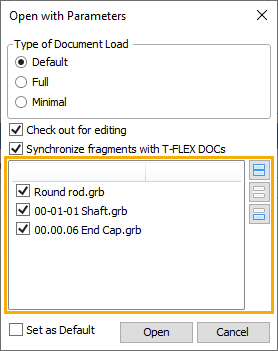
Double-click
Double-click ![]()
![]() a file in the
a file in the ![]() Files dataset window. If the file is not checked out for editing, the system will ask, if you want to check it out. Upon answering this question the Open with Parameters window will appear. Depending on the previously selected answer, the Check out for editing checkbox will be either enabled or disabled.
Files dataset window. If the file is not checked out for editing, the system will ask, if you want to check it out. Upon answering this question the Open with Parameters window will appear. Depending on the previously selected answer, the Check out for editing checkbox will be either enabled or disabled.
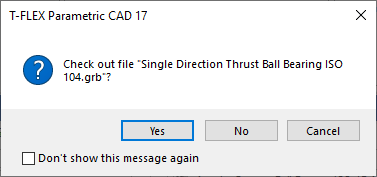
![]() Open for edit command
Open for edit command
This command is available in contextual menu of elements in the ![]() Product Structure dataset. It checks out an object for editing and opens the linked file in T-FLEX CAD. The Open with Parameters window is displayed before opening.
Product Structure dataset. It checks out an object for editing and opens the linked file in T-FLEX CAD. The Open with Parameters window is displayed before opening.
![]() Files item of contextual menu
Files item of contextual menu
A list of linked files is displayed, upon moving the cursor over the ![]() Files item in contextual menu of objects in DOCs datasets. Click
Files item in contextual menu of objects in DOCs datasets. Click ![]() a file in the list to open it. The Open with Parameters window is displayed before opening.
a file in the list to open it. The Open with Parameters window is displayed before opening.
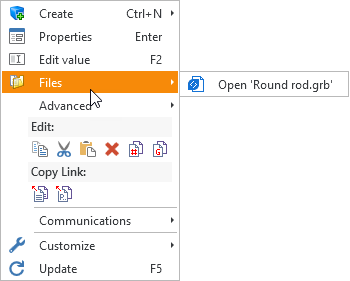
Icon |
Ribbon |
|---|---|
|
Get Started > Files > Open from T‑FLEX DOCs T‑FLEX DOCs > Work with Documents > Open from T‑FLEX DOCs |
Keyboard |
Textual Menu |
|
File > Open from T‑FLEX DOCs |
Upon calling the command, the window is displayed, where you should select a file to be opened.

By default, files are selected from the ![]() Files dataset. The Dataset drop-down list located at the top of the window contains following options::
Files dataset. The Dataset drop-down list located at the top of the window contains following options::
•Add...
Opens the dataset selection window. You should only select those datasets, whose objects are linked to objects of the ![]() Files dataset. Selecting objects from such datasets results in opening a linked file from the
Files dataset. Selecting objects from such datasets results in opening a linked file from the ![]() Files dataset. If you select some other dataset, objects selection will be unavailable and the selection window will contain the following message: "Object has no links to "Files" dataset".
Files dataset. If you select some other dataset, objects selection will be unavailable and the selection window will contain the following message: "Object has no links to "Files" dataset".
Along with the ![]() Open from T-FLEX DOCs command, this window is also used by other commands. The content of the list of datasets is the same for all commands.
Open from T-FLEX DOCs command, this window is also used by other commands. The content of the list of datasets is the same for all commands.

•Clear...
Deletes all manually added datasets from the list.
The command allows to select not only T-FLEX CAD files, but also files in third-party formats that can be imported into T-FLEX CAD.
Select the desired dataset and press the Open button. The system will ask, if you want to check out the file for editing. If you have selected a T-FLEX CAD file, then, depending on the answer, the file will be opened in T-FLEX CAD either for editing or read-only. If you have selected a file in external format, then the content of such file will be imported into a new T-FLEX CAD document.
In order to import content from a third-party format into the current document, use the ![]() Import (T‑FLEX DOCs) command.
Import (T‑FLEX DOCs) command.

Any local files or the whole content of any local folder can be imported to T-FLEX DOCs using the ![]() Import file and
Import file and ![]() Import folder commands. These commands are available in contextual menu of elements and in the toolbar of the
Import folder commands. These commands are available in contextual menu of elements and in the toolbar of the ![]() Files dataset window.
Files dataset window.
When ![]() saving product composition to DOCs, files of all composition's records are automatically saved to DOCs and linked to resulting objects of the
saving product composition to DOCs, files of all composition's records are automatically saved to DOCs and linked to resulting objects of the ![]() Product structure dataset.
Product structure dataset.
If a file is opened for editing in T-FLEX CAD from T-FLEX DOCs, then you can save its changes using the usual ![]() Save command. If a file has a linked object in the
Save command. If a file has a linked object in the ![]() Product structure dataset, then, upon saving the file, the product structure saving window will appear, displaying the changes in product structure caused by changes of the current file.
Product structure dataset, then, upon saving the file, the product structure saving window will appear, displaying the changes in product structure caused by changes of the current file.
The detailed information on saving the product structure is available in the Saving Product Composition to T-FLEX DOCs section.
If the opened file belongs to a dataset, which tracks files' changes (e.g. the ![]() Files dataset used for saving files by default), then, upon saving changes, you can apply or cancel them.
Files dataset used for saving files by default), then, upon saving changes, you can apply or cancel them.
The detailed information on tracking changes of DOCs objects can be found in the Applying changes in T-FLEX DOCs section and in the DOCs help.
If a file is opened in T-FLEX CAD from T-FLEX DOCs read-only, then its changes won't be saved by the ![]() Save command. In such case, changes can only be saved either into another DOCs file using the
Save command. In such case, changes can only be saved either into another DOCs file using the ![]() Save to T-FLEX DOCs command, or into a local file using the
Save to T-FLEX DOCs command, or into a local file using the ![]() Save As command.
Save As command.
The current T‑FLEX CAD document can be saved as a new file in the T‑FLEX DOCs ![]() Files dataset using the following command:
Files dataset using the following command:
Icon |
Ribbon |
|---|---|
|
T‑FLEX DOCs > Work with Documents > Save to T‑FLEX DOCs |
Keyboard |
Textual Menu |
|
File > Save to T‑FLEX DOCs |
Upon calling the command, the ![]() Files dataset window will appear, where you have to select a folder for the file to be saved into.
Files dataset window will appear, where you have to select a folder for the file to be saved into.
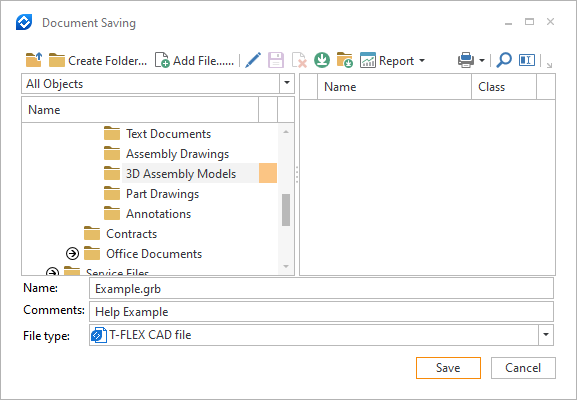
Following controls are available in the lower section of the window:
•Name
Here you can type a name of the resulting file.
•Comments
Here you can type an additional information, which can be viewed in the Comment section of resulting file's properties.
•File type
Here you can see the format of the resulting file. In this case the format cannot be changed. If you need to save a file into formats of other systems, use the ![]() Export (T-FLEX DOCs) command.
Export (T-FLEX DOCs) command.
Properties of files in T-FLEX DOCs
Properties window of a file or any other object in DOCs can called, using the ![]() Properties command, which is available in contextual menu of object in T-FLEX DOCs windows. The content of the properties window depends on the type of the object. The <Enter> button can be used fro calling this command only in DOCs windows, except the
Properties command, which is available in contextual menu of object in T-FLEX DOCs windows. The content of the properties window depends on the type of the object. The <Enter> button can be used fro calling this command only in DOCs windows, except the ![]() Files dataset window.
Files dataset window.
The properties panel can be displayed in the ![]() Product structure dataset window. Press the
Product structure dataset window. Press the ![]() Properties button in the toolbar to invoke the properties panel. The panel has the same content as the properties window. However, unlike the properties window, the panel doesn't block other windows, and the content of the panel is automatically updated depending on the selected object.
Properties button in the toolbar to invoke the properties panel. The panel has the same content as the properties window. However, unlike the properties window, the panel doesn't block other windows, and the content of the panel is automatically updated depending on the selected object.
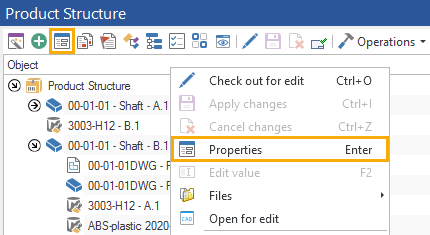
T-FLEX DOCs properties window can be invoked for the current T-FLEX CAD document using the following command, if the document is opened from DOCs:
Icon |
Ribbon |
|---|---|
|
T‑FLEX DOCs > Additional > Properties in T‑FLEX DOCs |
Keyboard |
Textual Menu |
|
File > Properties in T‑FLEX DOCs |
The command invokes the window, which has the following layout:
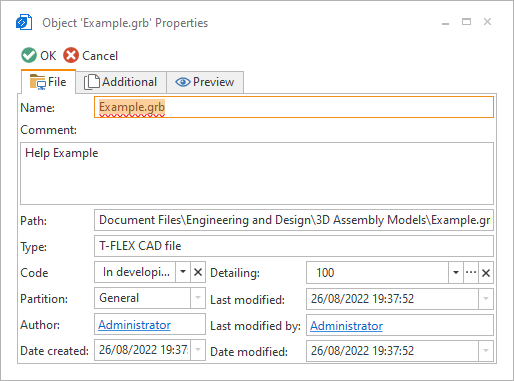
If a file is opened read-only, then the ![]() Check out for edit command will be available at the top left corner of the window.
Check out for edit command will be available at the top left corner of the window.
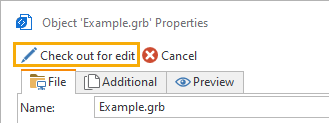
The detailed information on properties of various object in T-FLEX DOCs is available in the T-FLEX DOCs help.